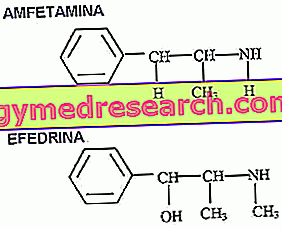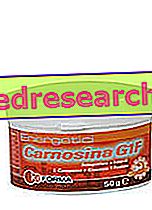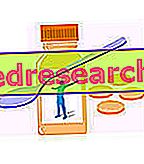Ephedrine is a protoalkaloid extracted from some plants belonging to the genus Ephedra (family Ephedraceae).
Structurally similar to amphetamine, of which it is the natural precursor, ephedrine is used to improve concentration, to suppress appetite, to promote weight loss and to treat asthma and hypotension. In ophthalmology ephedrine is used as a mydriatic drug (it has the capacity to dilate the pupil).


Despite the well-documented side effects, ephedrine is also available in large quantities in Italy, as it is present as an active ingredient in many over-the-counter products sold in pharmacies or parapharmacies.
Sometimes ephedrine is called Ma Huang ( Ephedra sinica ) referring to the name of a plant very popular in traditional Chinese medicine and particularly rich in ephedrine.
Ephedrine and weight loss
Ephedrine is contained in many "slimming" products. One of the most interesting features of this substance, similar but more powerful than that exerted by caffeine, concerns the ability to accelerate the metabolism by stimulating the secretion of catecholamines.
This effect, associated with the inhibiting power on appetite, is not quantifiable and varies from subject to subject. However, taking ephedrine-based products for weight loss may be improper and potentially dangerous.
In order to limit the abuse of this substance for slimming purposes, from 11 December 2015 it is forbidden for doctors to prescribe masterly preparations containing ephedrine for slimming purposes, and to pharmacists to perform these preparations for the same purpose.
Doping and ephedrine
In the world of sports, ephedrine has a greater interest than caffeine, both in terms of easier administration and in terms of the more immediate and prolonged effect at lower doses. However, its stimulating effect is lower than that of amphetamines.
Ephedrine, for values over 10 micrograms / ml detected in urine, is positive for doping and is included in the class of prohibited substances prepared by the International Olympic Committee (IOC)
Side effects of ephedrine
Deepening on the side effects of ephedrine
Concomitant use of ephedrine or pseudoephedrine and other stimulants such as caffeine and amphetamines should be avoided; in addition to the doping effects, the collateral effects that put a strain on the nervous and cardiovascular system are amplified, to the extent of producing arrhythmias and cerebrovascular disorders of considerable magnitude.
Particularly at risk are those who already suffer from heart problems, thyroid diseases and diabetes. In all these cases the consumption of products containing ephedrine (even in small doses) is strongly advised against.
NERVOUS SYSTEM
Acting as a stimulant on the central nervous system, ephedrine can induce restlessness, nervousness, hallucinations, convulsions, insomnia, psychosis and tremors; once its effect is over the individual falls into a state of profound sedation with the appearance of depression and suicidal thoughts
CARDIOVASCULAR SYSTEM
the use of ephedrine significantly increases blood pressure (hypertension) and heart rate (tachycardia). In predisposed subjects the abuse of ephedrine can lead to death from cardiac arrest (the disappearance of the pitcher Steve Bechler of the Baltimore Orioles, in which the autoptico exam determines that the ephedra had a role in his death) dates back to 17 February 2003
URINARY SYSTEM
bladder retention from sphincteric detrusor hypertonus
OTHER SIDE EFFECTS
Gastrointestinal disorders (nausea, vomiting, constipation)
Healthy ephedrine alternatives
- To suppress the appetite see: Increase the sense of satiety
- To increase the metabolism see: Accelerate metabolism
- To promote weight loss see: Special weight loss
See also: Ephedrine and sports - Pseudoephedrine - Ephedrine: properties and contraindications



